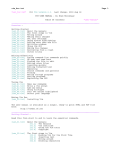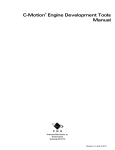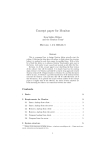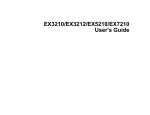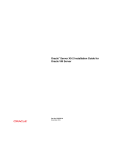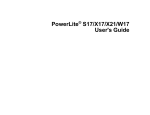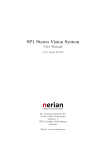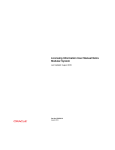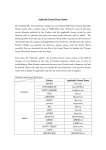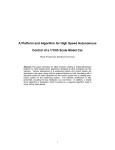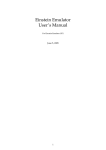Download Licensing Information User Manual Oracle Server X5-2
Transcript
Licensing Information User Manual Oracle Server X5-2 Last Updated: April 2015 Part No: E48322-03 May 2015 Copyright © 2014, 2015, Oracle and/or its affiliates. All rights reserved. This software and related documentation are provided under a license agreement containing restrictions on use and disclosure and are protected by intellectual property laws. Except as expressly permitted in your license agreement or allowed by law, you may not use, copy, reproduce, translate, broadcast, modify, license, transmit, distribute, exhibit, perform, publish, or display any part, in any form, or by any means. Reverse engineering, disassembly, or decompilation of this software, unless required by law for interoperability, is prohibited. The information contained herein is subject to change without notice and is not warranted to be error-free. If you find any errors, please report them to us in writing. If this is software or related documentation that is delivered to the U.S. Government or anyone licensing it on behalf of the U.S. Government, then the following notice is applicable: U.S. GOVERNMENT END USERS. Oracle programs, including any operating system, integrated software, any programs installed on the hardware, and/or documentation, delivered to U.S. Government end users are "commercial computer software" pursuant to the applicable Federal Acquisition Regulation and agency-specific supplemental regulations. As such, use, duplication, disclosure, modification, and adaptation of the programs, including any operating system, integrated software, any programs installed on the hardware, and/or documentation, shall be subject to license terms and license restrictions applicable to the programs. No other rights are granted to the U.S. Government. This software or hardware is developed for general use in a variety of information management applications. It is not developed or intended for use in any inherently dangerous applications, including applications that may create a risk of personal injury. If you use this software or hardware in dangerous applications, then you shall be responsible to take all appropriate fail-safe, backup, redundancy, and other measures to ensure its safe use. Oracle Corporation and its affiliates disclaim any liability for any damages caused by use of this software or hardware in dangerous applications. Oracle and Java are registered trademarks of Oracle and/or its affiliates. Other names may be trademarks of their respective owners. Intel and Intel Xeon are trademarks or registered trademarks of Intel Corporation. All SPARC trademarks are used under license and are trademarks or registered trademarks of SPARC International, Inc. AMD, Opteron, the AMD logo, and the AMD Opteron logo are trademarks or registered trademarks of Advanced Micro Devices. UNIX is a registered trademark of The Open Group. This software or hardware and documentation may provide access to or information about content, products, and services from third parties. Oracle Corporation and its affiliates are not responsible for and expressly disclaim all warranties of any kind with respect to third-party content, products, and services unless otherwise set forth in an applicable agreement between you and Oracle. Oracle Corporation and its affiliates will not be responsible for any loss, costs, or damages incurred due to your access to or use of third-party content, products, or services, except as set forth in an applicable agreement between you and Oracle. Documentation Accessibility For information about Oracle's commitment to accessibility, visit the Oracle Accessibility Program website at http://www.oracle.com/pls/topic/lookup?ctx=acc&id=docacc. Access to Oracle Support Oracle customers that have purchased support have access to electronic support through My Oracle Support. For information, visit http://www.oracle.com/pls/topic/lookup? ctx=acc&id=info or visit http://www.oracle.com/pls/topic/lookup?ctx=acc&id=trs if you are hearing impaired. Copyright © 2014, 2015, Oracle et/ou ses affiliés. Tous droits réservés. Ce logiciel et la documentation qui l’accompagne sont protégés par les lois sur la propriété intellectuelle. Ils sont concédés sous licence et soumis à des restrictions d’utilisation et de divulgation. Sauf stipulation expresse de votre contrat de licence ou de la loi, vous ne pouvez pas copier, reproduire, traduire, diffuser, modifier, breveter, transmettre, distribuer, exposer, exécuter, publier ou afficher le logiciel, même partiellement, sous quelque forme et par quelque procédé que ce soit. Par ailleurs, il est interdit de procéder à toute ingénierie inverse du logiciel, de le désassembler ou de le décompiler, excepté à des fins d’interopérabilité avec des logiciels tiers ou tel que prescrit par la loi. Les informations fournies dans ce document sont susceptibles de modification sans préavis. Par ailleurs, Oracle Corporation ne garantit pas qu’elles soient exemptes d’erreurs et vous invite, le cas échéant, à lui en faire part par écrit. Si ce logiciel, ou la documentation qui l’accompagne, est concédé sous licence au Gouvernement des Etats-Unis, ou à toute entité qui délivre la licence de ce logiciel ou l’utilise pour le compte du Gouvernement des Etats-Unis, la notice suivante s’applique: U.S. GOVERNMENT END USERS. Oracle programs, including any operating system, integrated software, any programs installed on the hardware, and/or documentation, delivered to U.S. Government end users are "commercial computer software" pursuant to the applicable Federal Acquisition Regulation and agency-specific supplemental regulations. As such, use, duplication, disclosure, modification, and adaptation of the programs, including any operating system, integrated software, any programs installed on the hardware, and/or documentation, shall be subject to license terms and license restrictions applicable to the programs. No other rights are granted to the U.S. Government. Ce logiciel ou matériel a été développé pour un usage général dans le cadre d’applications de gestion des informations. Ce logiciel ou matériel n’est pas conçu ni n’est destiné à être utilisé dans des applications à risque, notamment dans des applications pouvant causer des dommages corporels. Si vous utilisez ce logiciel ou matériel dans le cadre d’applications dangereuses, il est de votre responsabilité de prendre toutes les mesures de secours, de sauvegarde, de redondance et autres mesures nécessaires à son utilisation dans des conditions optimales de sécurité. Oracle Corporation et ses affiliés déclinent toute responsabilité quant aux dommages causés par l’utilisation de ce logiciel ou matériel pour ce type d’applications. Oracle et Java sont des marques déposées d’Oracle Corporation et/ou de ses affiliés. Tout autre nom mentionné peut correspondre à des marques appartenant à d’autres propriétaires qu’Oracle. Intel et Intel Xeon sont des marques ou des marques déposées d’Intel Corporation. Toutes les marques SPARC sont utilisées sous licence et sont des marques ou des marques déposées de SPARC International, Inc. AMD, Opteron, le logo AMD et le logo AMD Opteron sont des marques ou des marques déposées d’Advanced Micro Devices. UNIX est une marque déposée d’The Open Group. Ce logiciel ou matériel et la documentation qui l’accompagne peuvent fournir des informations ou des liens donnant accès à des contenus, des produits et des services émanant de tiers. Oracle Corporation et ses affiliés déclinent toute responsabilité ou garantie expresse quant aux contenus, produits ou services émanant de tiers, sauf mention contraire stipulée dans un contrat entre vous et Oracle. En aucun cas, Oracle Corporation et ses affiliés ne sauraient être tenus pour responsables des pertes subies, des coûts occasionnés ou des dommages causés par l’accès à des contenus, produits ou services tiers, ou à leur utilisation, sauf mention contraire stipulée dans un contrat entre vous et Oracle. Accessibilité de la documentation Pour plus d’informations sur l’engagement d’Oracle pour l’accessibilité à la documentation, visitez le site Web Oracle Accessibility Program, à l'adresse http://www.oracle.com/ pls/topic/lookup?ctx=acc&id=docacc. Accès au support électronique Les clients Oracle qui ont souscrit un contrat de support ont accès au support électronique via My Oracle Support. Pour plus d'informations, visitez le site http://www.oracle.com/ pls/topic/lookup?ctx=acc&id=info ou le site http://www.oracle.com/pls/topic/lookup?ctx=acc&id=trs si vous êtes malentendant. Contents 1 Introduction ..................................................................................................... 7 2 Licensing Information ..................................................................................... 9 Oracle Technology Notices and Licenses ............................................................. 9 Oracle Solaris ......................................................................................... 9 Oracle Linux ........................................................................................... 9 Oracle VM ............................................................................................. 9 Oracle Integrated Lights Out Manager ......................................................... 9 Oracle System Assistant .......................................................................... 10 Oracle Hardware Management Pack .......................................................... 10 Third Party Notices and/or Licenses .................................................................. 10 Commercial Software ............................................................................. 10 Open Source Software .................................................................................... 18 Election to Use GPL v2 or LGPL v 2.1 Where Applicable ............................. 18 GNU General Public License (GPL) v2 ..................................................... 18 GNU Lesser General Public License (LGPL) v2.1 ....................................... 25 5 6 Licensing Information User Manual Oracle Server X5-2 • May 2015 1 ♦ ♦ ♦ C H A P T E R 1 Introduction This Licensing Information document is a part of the product or program documentation under the terms of your Oracle license agreement and is intended to help you understand the program editions, entitlements, restrictions, prerequisites, special license rights, and/or separately licensed third party technology terms associated with the Oracle software program(s) covered by this document (the "Program(s)"). Entitled or restricted use products or components identified in this document that are not provided with the particular Program may be obtained from the Oracle Software Delivery Cloud website (https://edelivery.oracle.com) or from media Oracle may provide. If you have a question about your license rights and obligations, please contact your Oracle sales representative, review the information provided in Oracle's Software Investment Guide (http://www.oracle.com/us/corporate/pricing/ software-investment-guide/index.html), and/or contact the applicable Oracle License Management Services representative listed on http://www.oracle.com/us/corporate/ license-management-services/index.html. Chapter 1 • Introduction 7 8 Licensing Information User Manual Oracle Server X5-2 • May 2015 2 ♦ ♦ ♦ C H A P T E R 2 Licensing Information This document contains product licensing information for the Oracle Server X5-2. Oracle Technology Notices and Licenses Oracle Solaris The Oracle Solaris 11.2 third party license information is available at: http://docs.oracle.com/cd/E36784_01/index.html Oracle Linux The Oracle Linux third party license information is available at: https://oss.oracle.com/linux/legal/pkg-list.html Oracle VM The Oracle VM third party license information is available at: http://docs.oracle.com/cd/E50245_01/index.html Oracle Integrated Lights Out Manager The Oracle Integrated Lights Out Manager third party license information is available at: http://docs.oracle.com/cd/E37444_01/index.html Chapter 2 • Licensing Information 9 Third Party Notices and/or Licenses Oracle System Assistant The Oracle System Assistant third party license information is available at: http://docs.oracle.com/cd/E29422_01/index.html Oracle Hardware Management Pack The Oracle Hardware Management Pack third party license information is available at: http://docs.oracle.com/cd/E52095_01/index.html Third Party Notices and/or Licenses Commercial Software Commercial software products or components distributed in the Oracle Server X5-2 are identified in this section along with applicable licensing information. SourceFourge EDK2 for UEFI Development UDK2014 Copyright © 1993 Intel Corporation Copyright © 1999 – 2002, Intel Corporation. All rights reserved. Copyright © 1999 – 2005, Intel Corporation. All rights reserved. Copyright © 1999 – 2007, Intel Corporation. All rights reserved. Copyright © 1999 – 2008, Intel Corporation. All rights reserved. Copyright © 1999 – 2010, Intel Corporation. All rights reserved. Copyright © 1999 – 2011, Intel Corporation. All rights reserved. Copyright © 2001 – 2006, Intel Corporation. All rights reserved. Copyright © 2001 – 2002, Intel Corporation. All rights reserved. Copyright © 2004 – 2005, Intel Corporation. All rights reserved. Copyright © 2004 – 2006, Intel Corporation. All rights reserved. 10 Licensing Information User Manual Oracle Server X5-2 • May 2015 Third Party Notices and/or Licenses Copyright © 2004 – 2007, Intel Corporation. All rights reserved. Copyright © 2004 – 2008, Intel Corporation. All rights reserved. Copyright © 2004 – 2009, Intel Corporation. All rights reserved. Copyright © 2004 – 2010, Intel Corporation. All rights reserved. Copyright © 2004 – 2011, Intel Corporation. All rights reserved. Copyright © 2004, Intel Corporation. All rights reserved. Copyright © 2005 – 2006, Intel Corporation. All rights reserved. Copyright © 2005 – 2007, Intel Corporation. All rights reserved. Copyright © 2005 – 2008, Intel Corporation. All rights reserved. Copyright © 2005 – 2009, Intel Corporation. All rights reserved. Copyright © 2005 – 2010, Intel Corporation. All rights reserved. Copyright © 2005 – 2011, Intel Corporation. All rights reserved. Copyright © 2005, Intel Corporation. All rights reserved. Copyright © 2006 – 2007, Intel Corporation. All rights reserved. Copyright © 2006 – 2008, Intel Corporation. All rights reserved. Copyright © 2006 – 2010, Intel Corporation. All rights reserved. Copyright © 2006 – 2011, Intel Corporation. All rights reserved. Copyright © 2007 – 2008, Intel Corporation. All rights reserved. Copyright © 2007 – 2009, Intel Corporation. All rights reserved. Copyright © 2007 – 2010, FOO1 Corporation. All rights reserved. Copyright © 2007 – 2011, Intel Corporation. All rights reserved. Copyright © 2007, Intel Corporation. All rights reserved. Copyright © 2010 Intel Corporation All Rights Reserved. Copyright © 2011 Intel Corporation. All rights reserved Copyright © 2007 – 2009, Intel Corporation. All rights reserved. Copyright © 2008 – 2011, Intel Corporation. All rights reserved. Copyright © 2008, Intel Corporation. All rights reserved. Chapter 2 • Licensing Information 11 Third Party Notices and/or Licenses Copyright © 2009 – 2011, Intel Corporation. All rights reserved. Copyright © 2006, Intel Corporation. All rights reserved. Copyright © 2002 – 2007, Intel Corporation. All rights reserved. Copyright © 2011 Intel Corporation. All rights reserved Copyright © 1999 – 2012, Intel Corporation. All rights reserved. Copyright © 2004 – 2012, Intel Corporation. All rights reserved. Copyright © 2005 – 2012, Intel Corporation. All rights reserved. Copyright © 2006 – 2012, Intel Corporation. All rights reserved. Copyright © 2007 – 2012, Intel Corporation. All rights reserved. Copyright © 2008 – 2012, Intel Corporation. All rights reserved. Copyright © 2009 – 2012, Intel Corporation. All rights reserved. Copyright © 2010 – 2012, Intel Corporation. All rights reserved. Copyright © 2011 – 2012, Intel Corporation. All rights reserved. Copyright © 1999 – 2012, Intel Corporation. All rights reserved. Copyright © 1999 – 2013, Intel Corporation. All rights reserved. Copyright © 2004 – 2013, Intel Corporation. All rights reserved. Copyright © 2005 – 2013, Intel Corporation. All rights reserved. Copyright © 2006 – 2013, Intel Corporation. All rights reserved. Copyright © 2007 – 2013, Intel Corporation. All rights reserved. Copyright © 2008 – 2013, Intel Corporation. All rights reserved. Copyright © 2009 – 2013, Intel Corporation. All rights reserved. Copyright © 2010 – 2013, Intel Corporation. All rights reserved. Copyright © 2011 – 2013, Intel Corporation. All rights reserved. Copyright © 2012 – 2013, Intel Corporation. All rights reserved. Copyright © 2013, Intel Corporation. All rights reserved. Copyright © 2013 – 2014, Intel Corporation. All rights reserved. Copyright © 2013, Red Hat, Inc. 12 Licensing Information User Manual Oracle Server X5-2 • May 2015 Third Party Notices and/or Licenses Copyright © 2013, ARM Ltd. All rights reserved. Copyright © 2009–2013, ARM Ltd. All rights reserved. Copyright © 2013 Hewlett-Packard Development Company, L.P. Copyright © 2004 – 2014, Intel Corporation. All rights reserved. Copyright © 2005 – 2014, Intel Corporation. All rights reserved. Copyright © 2006 – 2014, Intel Corporation. All rights reserved. Copyright © 2007 – 2014, Intel Corporation. All rights reserved. Copyright © 2008 – 2014, Intel Corporation. All rights reserved. Copyright © 2009 – 2014, Intel Corporation. All rights reserved. Copyright © 2010 – 2014, Intel Corporation. All rights reserved. Copyright © 2011 – 2014, Intel Corporation. All rights reserved. Copyright © 2012 – 2014, Intel Corporation. All rights reserved. Copyright © 2013 – 2014, Intel Corporation. All rights reserved. Copyright © 2014, Intel Corporation. All rights reserved. Copyright © 1990,1994 The University of Utah and Copyright © 1990–2000 Info-ZIP. All rights reserved. Copyright © 1990 Regents of the University of California. Copyright © 1991,1990,1989,1994,1995,1996 Carnegie Mellon University Copyright © 1991, 1992 by Xerox Corporation. All rights reserved. Copyright © 1991–1994 by Xerox Corporation. All rights reserved. Copyright © 1991–1995 by Xerox Corporation. All rights reserved. Copyright © 1991–1996 by Xerox Corporation. All rights reserved. Copyright © 1991 by AT&T. Copyright © 1991 by Xerox Corporation. All rights reserved. Copyright © 1991 Regents of the University of California. Copyright © 1992, 1991, 1990 MIPS Computer Systems, Inc.| Copyright © 1992–1994 by Xerox Corporation. All rights reserved. Chapter 2 • Licensing Information 13 Third Party Notices and/or Licenses Copyright © 1993–1994 by Xerox Corporation. All rights reserved. Copyright © 1993 Carnegie Mellon University Copyright © 1994, 1995, 1996 Carnegie-Mellon University. Copyright © 1994–1997 Mark Brinicombe. Copyright © 1994, 1999 The NetBSD Foundation, Inc. Copyright © 1994–2009 Red Hat, Inc. All rights reserved. Copyright © 1994 by Xerox Corporation. All rights reserved. Copyright © 1994 Free Software Foundation, Inc. Copyright © 1994 Winning Strategies, Inc. Copyright © 1995, 1996, 1997 Kungliga Tekniska Högskolan Copyright © 1995,1996 by Internet Software Consortium. Copyright © 1995, 1996 Carnegie-Mellon University. Copyright © 1995 Alex Tatmanjants <[email protected]> Copyright © 1995 Carnegie-Mellon University. Copyright © 1996, 1997, 1998, 1999, 2002 Free Software Foundation, Inc. Copyright © 1996, 1997, 1998, 1999, 2004 Free Software Foundation, Inc. Copyright © 1996, 1997, 1998, 1999, 2005 Free Software Foundation, Inc. Copyright © 1996, 1997, 1998, 1999, 2006 Free Software Foundation, Inc. Copyright © 1996, 1997, 1998, 1999 Free Software Foundation, Inc. Copyright © 1996–1997 John D. Polstra. Copyright © 1996, 1998 by Internet Software Consortium. Copyright © 1996–1998 by Silicon Graphics. All rights reserved. Copyright © 1996–1999 by Silicon Graphics. All rights reserved. Copyright © 1996 by Internet Software Consortium. Copyright © 1996 by Silicon Graphics. All rights reserved. Copyright © 1996 Christos Zoulas. All rights reserved. Copyright © 1996 Mark Brinicombe 14 Licensing Information User Manual Oracle Server X5-2 • May 2015 Third Party Notices and/or Licenses Copyright © 1996 The NetBSD Foundation, Inc. Copyright © 1997, 1998, 1999, 2000 The NetBSD Foundation, Inc. Copyright © 1997, 1998, 2003 The NetBSD Foundation, Inc. Copyright © 1997, 1998, 2005, 2008 The NetBSD Foundation, Inc. Copyright © 1997, 1998 by Microstar Software Ltd. Copyright © 1997–2001 by Secret Labs AB. All rights reserved. Copyright © 1997–2002 FreeBSD Project. Copyright © 1997, 2002 The NetBSD Foundation, Inc. Copyright © 1997–2004 The NetBSD Foundation, Inc. Copyright © 1997 by Silicon Graphics. All rights reserved. Copyright © 1997 Causality Limited Copyright © 1997 Christos Zoulas. All rights reserved. Copyright © 1997 John D. Polstra. Copyright © 1997 Mark Brinicombe. Copyright © 1997 Todd C. Miller <[email protected]> Copyright © 1998, 1999, 2000, 2001 The NetBSD Foundation, Inc. Copyright © 1998–1999 by Silicon Graphics. All rights reserved. Copyright © 1998, 1999 Free Software Foundation Copyright © 1998, 2000 The NetBSD Foundation, Inc. Copyright © 1998 by Fergus Henderson. All rights reserved. Copyright © 1998 by Silicon Graphics. All rights reserved. Copyright © 1998 Doug Rabson Copyright © 1998 Free Software Foundation, Inc. Copyright © 1998 HD Associates, Inc. Copyright © 1998 John D. Polstra. Copyright © 1998, M. Warner Losh <[email protected]> Copyright © 1998 The NetBSD Foundation, Inc. Copyright © 1998 Todd C. Miller <[email protected]> Chapter 2 • Licensing Information 15 Third Party Notices and/or Licenses Copyright © 1999, 2000, 2001, 2002, 2003, 2006 by Red Hat, Inc. All rights reserved. Copyright © 1999–2001 by Hewlett-Packard Company. All rights reserved. Copyright © 1999 by Hewlett-Packard Company. All rights reserved. Copyright © 1999 Citrus Project, Copyright © 1999 Free Software Foundation. Copyright © 1999 Kungliga Tekniska Högskolan Copyright © 2000, 2001 Alexey Zelkin <[email protected]> Copyright © 2000–2001 Artur Grabowski <[email protected]> Copyright © 2000, 2001 Free Software Foundation. Copyright © 2000, 2001 The NetBSD Foundation, Inc. Copyright © 2000–2004 Hewlett-Packard Development Company, L.P. Copyright © 2000–2005 INRIA, France Telecom Copyright © 2000 by Hewlett-Packard Company. All rights reserved. Copyright © 2000 Doug Rabson Copyright © 2000 World Wide Web Consortium, Copyright © 2001, 2002, 2003, 2004, 2005, 2006, 2007 Free Software Foundation, Inc. Copyright © 2001, 2002, 2003 Peter Dimov and Multi Media Ltd. Copyright © 2001, 2002, 2006 Free Software Foundation. Copyright © 2001, 2002 The NetBSD Foundation, Inc. Copyright © 2001, 2007 Free Software Foundation, Inc. Copyright © 2001 by Hewlett-Packard Company. All rights reserved. Copyright © 2001 by Red Hat Inc. All rights reserved. Copyright © 2001, Thai Open Source Software Center Ltd, Sun Microsystems. Copyright © 2001 The NetBSD Foundation, Inc. Copyright © 2002, 2003, 2005 Free Software Foundation, Inc. Copyright © 2002, 2003 Marcel Moolenaar Copyright © 2002, 2004, 2005, 2007 Free Software Foundation, Inc. 16 Licensing Information User Manual Oracle Server X5-2 • May 2015 Third Party Notices and/or Licenses Copyright © 2002 Free Software Foundation, Inc. Copyright © 2002 Marcel Moolenaar Copyright © 2002 Mitsuru IWASAKI Copyright © 2002 The NetBSD Foundation, Inc. Copyright © 2003, 2006 Free Software Foundation, Inc. Copyright © 2003–2008 University of Illinois at Urbana-Champaign. Copyright © 2003, Artem B. Bityuckiy, SoftMine Corporation. Copyright © 2003 Free Software Foundation. Copyright © 2003 World Wide Web Consortium, Copyright © 2004, 2005, 2007 Free Software Foundation, Inc. Copyright © 2006 Citrus Project, Copyright © 2006 Free Software Foundation. Copyright © 2006 The NetBSD Foundation, Inc. Copyright © 2006, Tristan Gingold. All rights reserved. Copyright © 2008 – 2010, Apple Inc. All rights reserved. Copyright © 2008, Apple Inc. All rights reserved. Copyright © 2009, Apple Inc. All rights reserved. Copyright © 2009 ARM Ltd Copyright © 2009, Hewlett-Packard Company. All rights reserved. Copyright © 2010 – 2011, Apple Inc. All rights reserved. Copyright © 2010, Apple Inc. All rights reserved. Copyright © 2011, Andrei Warkentin <[email protected]> Copyright © 2011, Apple Inc. All rights reserved. Copyright © 2011, ARM. All rights reserved. Copyright © 2011, Bei Guan <[email protected]> Copyright © 2011 Hewlett Packard Corporation. All rights reserved. Redistribution and use in source and binary forms, with or without modification, are permitted provided that the following conditions are met: Chapter 2 • Licensing Information 17 Open Source Software 1. Redistributions of source code must retain the above copyright notice, this list of conditions and the following disclaimer. 2. Redistributions in binary form must reproduce the above copyright notice, this list of conditions and the following disclaimer in the documentation and/or other materials provided with the distribution. THIS SOFTWARE IS PROVIDED BY THE COPYRIGHT HOLDERS AND CONTRIBUTORS "AS IS" AND ANY EXPRESS OR IMPLIED WARRANTIES, INCLUDING, BUT NOT LIMITED TO, THE IMPLIED WARRANTIES OF MERCHANTABILITY AND FITNESS FOR A PARTICULAR PURPOSE ARE DISCLAIMED. IN NO EVENT SHALL THE COPYRIGHT HOLDER OR CONTRIBUTORS BE LIABLE FOR ANY DIRECT, INDIRECT, INCIDENTAL, SPECIAL, EXEMPLARY, OR CONSEQUENTIAL DAMAGES (INCLUDING, BUT NOT LIMITED TO, PROCUREMENT OF SUBSTITUTE GOODS OR SERVICES; LOSS OF USE, DATA, OR PROFITS; OR BUSINESS INTERRUPTION) HOWEVER CAUSED AND ON ANY THEORY OF LIABILITY, WHETHER IN CONTRACT, STRICT LIABILITY, OR TORT (INCLUDING NEGLIGENCE OR OTHERWISE) ARISING IN ANY WAY OUT OF THE USE OF THIS SOFTWARE, EVEN IF ADVISED OF THE POSSIBILITY OF SUCH DAMAGE. Open Source Software Required notices for open source software products or components distributed in the Oracle Server X5-2 are identified in this section along with the applicable licensing information. Additional notices and/or licenses may be found in the included documentation or readme files of the individual third party open source software. Election to Use GPL v2 or LGPL v 2.1 Where Applicable Oracle elects to use version 2.1 of the GNU Lesser General Public License ("LGPL") and/ or version 2 of the GNU General Public License ("GPL") for any software where a choice of LGPL/GPL license versions is made available and where the version of the LGPL/GPL is unspecified. GNU General Public License (GPL) v2 GNU GENERAL PUBLIC LICENSE Version 2, June 1991 18 Licensing Information User Manual Oracle Server X5-2 • May 2015 Open Source Software Copyright (C) 1989, 1991 Free Software Foundation, Inc. 51 Franklin Street, Fifth Floor, Boston, MA 02110-1301 USA Everyone is permitted to copy and distribute verbatim copies of this license document, but changing it is not allowed. Preamble The licenses for most software are designed to take away your freedom to share and change it. By contrast, the GNU General Public License is intended to guarantee your freedom to share and change free software--to make sure the software is free for all its users. This General Public License applies to most of the Free Software Foundation's software and to any other program whose authors commit to using it. (Some other Free Software Foundation software is covered by the GNU Library General Public License instead.) You can apply it to your programs, too. When we speak of free software, we are referring to freedom, not price. Our General Public Licenses are designed to make sure that you have the freedom to distribute copies of free software (and charge for this service if you wish), that you receive source code or can get it if you want it, that you can change the software or use pieces of it in new free programs; and that you know you can do these things. To protect your rights, we need to make restrictions that forbid anyone to deny you these rights or to ask you to surrender the rights. These restrictions translate to certain responsibilities for you if you distribute copies of the software, or if you modify it. For example, if you distribute copies of such a program, whether gratis or for a fee, you must give the recipients all the rights that you have. You must make sure that they, too, receive or can get the source code. And you must show them these terms so they know their rights. We protect your rights with two steps: (1) copyright the software, and (2) offer you this license which gives you legal permission to copy, distribute and/or modify the software. Also, for each author's protection and ours, we want to make certain that everyone understands that there is no warranty for this free software. If the software is modified by someone else and passed on, we want its recipients to know that what they have is not the original, so that any problems introduced by others will not reflect on the original authors' reputations. Finally, any free program is threatened constantly by software patents. We wish to avoid the danger that redistributors of a free program will individually obtain patent licenses, in effect making the program proprietary. To prevent this, we have made it clear that any patent must be licensed for everyone's free use or not licensed at all. The precise terms and conditions for copying, distribution and modification follow. GNU GENERAL PUBLIC LICENSE Chapter 2 • Licensing Information 19 Open Source Software TERMS AND CONDITIONS FOR COPYING, DISTRIBUTION AND MODIFICATION 0. This License applies to any program or other work which contains a notice placed by the copyright holder saying it may be distributed under the terms of this General Public License. The "Program", below, refers to any such program or work, and a "work based on the Program" means either the Program or any derivative work under copyright law: that is to say, a work containing the Program or a portion of it, either verbatim or with modifications and/or translated into another language. (Hereinafter, translation is included without limitation in the term "modification".) Each licensee is addressed as "you". Activities other than copying, distribution and modification are not covered by this License; they are outside its scope. The act of running the Program is not restricted, and the output from the Program is covered only if its contents constitute a work based on the Program (independent of having been made by running the Program). Whether that is true depends on what the Program does. 1. You may copy and distribute verbatim copies of the Program's source code as you receive it, in any medium, provided that you conspicuously and appropriately publish on each copy an appropriate copyright notice and disclaimer of warranty; keep intact all the notices that refer to this License and to the absence of any warranty; and give any other recipients of the Program a copy of this License along with the Program. You may charge a fee for the physical act of transferring a copy, and you may at your option offer warranty protection in exchange for a fee. 2. You may modify your copy or copies of the Program or any portion of it, thus forming a work based on the Program, and copy and distribute such modifications or work under the terms of Section 1 above, provided that you also meet all of these conditions: a. You must cause the modified files to carry prominent notices stating that you changed the files and the date of any change. b. You must cause any work that you distribute or publish, that in whole or in part contains or is derived from the Program or any part thereof, to be licensed as a whole at no charge to all third parties under the terms of this License. c. If the modified program normally reads commands interactively when run, you must cause it, when started running for such interactive use in the most ordinary way, to print or display an announcement including an appropriate copyright notice and a notice that there is no warranty (or else, saying that you provide a warranty) and that users may redistribute the program under these conditions, and telling the user how to view a copy of this License. (Exception: if the Program itself is interactive but does not normally print such an announcement, your work based on the Program is not required to print an announcement.) These requirements apply to the modified work as a whole. If identifiable sections of that work are not derived from the Program, and can be reasonably considered independent and separate works in themselves, then this License, and its terms, do not apply to those sections when you distribute them as separate works. But when you distribute the same sections as 20 Licensing Information User Manual Oracle Server X5-2 • May 2015 Open Source Software part of a whole which is a work based on the Program, the distribution of the whole must be on the terms of this License, whose permissions for other licensees extend to the entire whole, and thus to each and every part regardless of who wrote it. Thus, it is not the intent of this section to claim rights or contest your rights to work written entirely by you; rather, the intent is to exercise the right to control the distribution of derivative or collective works based on the Program. In addition, mere aggregation of another work not based on the Program with the Program (or with a work based on the Program) on a volume of a storage or distribution medium does not bring the other work under the scope of this License. 3. You may copy and distribute the Program (or a work based on it, under Section 2) in object code or executable form under the terms of Sections 1 and 2 above provided that you also do one of the following: a. Accompany it with the complete corresponding machine-readable source code, which must be distributed under the terms of Sections 1 and 2 above on a medium customarily used for software interchange; o b. Accompany it with a written offer, valid for at least three years, to give any third party, for a charge no more than your cost of physically performing source distribution, a complete machine-readable copy of the corresponding source code, to be distributed under the terms of Sections 1 and 2 above on a medium customarily used for software interchange; or c. Accompany it with the information you received as to the offer to distribute corresponding source code. (This alternative is allowed only for noncommercial distribution and only if you received the program in object code or executable form with such an offer, in accord with Subsection b above.) The source code for a work means the preferred form of the work for making modifications to it. For an executable work, complete source code means all the source code for all modules it contains, plus any associated interface definition files, plus the scripts used to control compilation and installation of the executable. However, as a special exception, the source code distributed need not include anything that is normally distributed (in either source or binary form) with the major components (compiler, kernel, and so on) of the operating system on which the executable runs, unless that component itself accompanies the executable. If distribution of executable or object code is made by offering access to copy from a designated place, then offering equivalent access to copy the source code from the same place counts as distribution of the source code, even though third parties are not compelled to copy the source along with the object code. 4. You may not copy, modify, sublicense, or distribute the Program except as expressly provided under this License. Any attempt otherwise to copy, modify, sublicense or distribute the Program is void, and will automatically terminate your rights under this License. However, parties who have received copies, or rights, from you under this License will not have their licenses terminated so long as such parties remain in full compliance. 5. You are not required to accept this License, since you have not signed it. However, nothing else grants you permission to modify or distribute the Program or its derivative works. Chapter 2 • Licensing Information 21 Open Source Software These actions are prohibited by law if you do not accept this License. Therefore, by modifying or distributing the Program (or any work based on the Program), you indicate your acceptance of this License to do so, and all its terms and conditions for copying, distributing or modifying the Program or works based on it. 6. Each time you redistribute the Program (or any work based on the Program), the recipient automatically receives a license from the original licensor to copy, distribute or modify the Program subject to these terms and conditions. You may not impose any further restrictions on the recipients' exercise of the rights granted herein. You are not responsible for enforcing compliance by third parties to this License. 7. If, as a consequence of a court judgment or allegation of patent infringement or for any other reason (not limited to patent issues), conditions are imposed on you (whether by court order, agreement or otherwise) that contradict the conditions of this License, they do not excuse you from the conditions of this License. If you cannot distribute so as to satisfy simultaneously your obligations under this License and any other pertinent obligations, then as a consequence you may not distribute the Program at all. For example, if a patent license would not permit royalty-free redistribution of the Program by all those who receive copies directly or indirectly through you, then the only way you could satisfy both it and this License would be to refrain entirely from distribution of the Program. If any portion of this section is held invalid or unenforceable under any particular circumstance, the balance of the section is intended to apply and the section as a whole is intended to apply in other circumstances. It is not the purpose of this section to induce you to infringe any patents or other property right claims or to contest validity of any such claims; this section has the sole purpose of protecting the integrity of the free software distribution system, which is implemented by public license practices. Many people have made generous contributions to the wide range of software distributed through that system in reliance on consistent application of that system; it is up to the author/donor to decide if he or she is willing to distribute software through any other system and a licensee cannot impose that choice. This section is intended to make thoroughly clear what is believed to be a consequence of the rest of this License. 8. If the distribution and/or use of the Program is restricted in certain countries either by patents or by copyrighted interfaces, the original copyright holder who places the Program under this License may add an explicit geographical distribution limitation excluding those countries, so that distribution is permitted only in or among countries not thus excluded. In such case, this License incorporates the limitation as if written in the body of this License. 9. The Free Software Foundation may publish revised and/or new versions of the General Public License from time to time. Such new versions will be similar in spirit to the present version, but may differ in detail to address new problems or concerns. Each version is given a distinguishing version number. If the Program specifies a version number of this License which applies to it and "any later version", you have the option of following the terms and conditions either of that version or of any later version published by the Free Software Foundation. If the Program does not specify a version number of this License, you may choose any version ever published by the Free Software Foundation. 22 Licensing Information User Manual Oracle Server X5-2 • May 2015 Open Source Software 10. If you wish to incorporate parts of the Program into other free programs whose distribution conditions are different, write to the author to ask for permission. For software which is copyrighted by the Free Software Foundation, write to the Free Software Foundation; we sometimes make exceptions for this. Our decision will be guided by the two goals of preserving the free status of all derivatives of our free software and of promoting the sharing and reuse of software generally. NO WARRANTY 11. BECAUSE THE PROGRAM IS LICENSED FREE OF CHARGE, THERE IS NO WARRANTY FOR THE PROGRAM, TO THE EXTENT PERMITTED BY APPLICABLE LAW. EXCEPT WHEN OTHERWISE STATED IN WRITING THE COPYRIGHT HOLDERS AND/OR OTHER PARTIES PROVIDE THE PROGRAM "AS IS" WITHOUT WARRANTY OF ANY KIND, EITHER EXPRESSED OR IMPLIED, INCLUDING, BUT NOT LIMITED TO, THE IMPLIED WARRANTIES OF MERCHANTABILITY AND FITNESS FOR A PARTICULAR PURPOSE. THE ENTIRE RISK AS TO THE QUALITY AND PERFORMANCE OF THE PROGRAM IS WITH YOU. SHOULD THE PROGRAM PROVE DEFECTIVE, YOU ASSUME THE COST OF ALL NECESSARY SERVICING, REPAIR OR CORRECTION. 12. IN NO EVENT UNLESS REQUIRED BY APPLICABLE LAW OR AGREED TO IN WRITING WILL ANY COPYRIGHT HOLDER, OR ANY OTHER PARTY WHO MAY MODIFY AND/OR REDISTRIBUTE THE PROGRAM AS PERMITTED ABOVE, BE LIABLE TO YOU FOR DAMAGES, INCLUDING ANY GENERAL, SPECIAL, INCIDENTAL OR CONSEQUENTIAL DAMAGES ARISING OUT OF THE USE OR INABILITY TO USE THE PROGRAM (INCLUDING BUT NOT LIMITED TO LOSS OF DATA OR DATA BEING RENDERED INACCURATE OR LOSSES SUSTAINED BY YOU OR THIRD PARTIES OR A FAILURE OF THE PROGRAM TO OPERATE WITH ANY OTHER PROGRAMS), EVEN IF SUCH HOLDER OR OTHER PARTY HAS BEEN ADVISED OF THE POSSIBILITY OF SUCH DAMAGES. END OF TERMS AND CONDITIONS How to Apply These Terms to Your New Programs If you develop a new program, and you want it to be of the greatest possible use to the public, the best way to achieve this is to make it free software which everyone can redistribute and change under these terms. To do so, attach the following notices to the program. It is safest to attach them to the start of each source file to most effectively convey the exclusion of warranty; and each file should have at least the "copyright" line and a pointer to where the full notice is found. <one line to give the program's name and a brief idea of what it does.> Chapter 2 • Licensing Information 23 Open Source Software Copyright (C) <year> <name of author> This program is free software; you can redistribute it and/or modify it under the terms of the GNU General Public License as published by the Free Software Foundation; either version 2 of the License, or (at your option) any later version. This program is distributed in the hope that it will be useful, but WITHOUT ANY WARRANTY; without even the implied warranty of MERCHANTABILITY or FITNESS FOR A PARTICULAR PURPOSE. See the GNU General Public License for more details. You should have received a copy of the GNU General Public License along with this program; if not, write to the Free Software Foundation, Inc., 51 Franklin Street, Fifth Floor, Boston, MA 02110-1301 USA Also add information on how to contact you by electronic and paper mail If the program is interactive, make it output a short notice like this when it starts in an interactive mode: Gnomovision version 69, Copyright (C) year name of author Gnomovision comes with ABSOLUTELY NO WARRANTY; for details type `show w'. This is free software, and you are welcome to redistribute it under certain conditions; type `show c' for details The hypothetical commands `show w' and `show c' should show the appropriate parts of the General Public License. Of course, the commands you use may be called something other than `show w' and `show c'; they could even be mouse-clicks or menu items—whatever suits your program. You should also get your employer (if you work as a programmer) or your school, if any, to sign a "copyright disclaimer" for the program, if necessary. Here is a sample; alter the names: Yoyodyne, Inc., hereby disclaims all copyright interest in the program `Gnomovision' (which makes passes at compilers) written by James Hacker. <signature of Ty Coon>, 1 April 1989 Ty Coon, President of Vice This General Public License does not permit incorporating your program into proprietary programs. If your program is a subroutine library, you may consider it more useful to permit linking proprietary applications with the library. If this is what you want to do, use the GNU Library General Public License instead of this License. 24 Licensing Information User Manual Oracle Server X5-2 • May 2015 Open Source Software GNU Lesser General Public License (LGPL) v2.1 GNU LESSSER GENERAL PUBLIC LICENSE Version 2.1, February 1999 Copyright (C) 1991, 1999 Free Software Foundation, Inc. 51 Franklin Street, Fifth Floor, Boston, MA 02110-1301 USA Everyone is permitted to copy and distribute verbatim copies of this license document, but changing it is not allowed. [This is the first released version of the Lesser GPL. It also counts as the successor of the GNU Library Public License, version 2, hence the version number 2.1.] Preamble The licenses for most software are designed to take away your freedom to share and change it. By contrast, the GNU General Public Licenses are intended to guarantee your freedom to share and change free software--to make sure the software is free for all its users. This license, the Lesser General Public License, applies to some specially designated software packages--typically libraries--of the Free Software Foundation and other authors who decide to use it. You can use it too, but we suggest you first think carefully about whether this license or the ordinary General Public License is the better strategy to use in any particular case, based on the explanations below. When we speak of free software, we are referring to freedom of use, not price. Our General Public Licenses are designed to make sure that you have the freedom to distribute copies of free software (and charge for this service if you wish); that you receive source code or can get it if you want it; that you can change the software and use pieces of it in new free programs; and that you are informed that you can do these things. To protect your rights, we need to make restrictions that forbid distributors to deny you these rights or to ask you to surrender these rights. These restrictions translate to certain responsibilities for you if you distribute copies of the library or if you modify it. For example, if you distribute copies of the library, whether gratis or for a fee, you must give the recipients all the rights that we gave you. You must make sure that they, too, receive or can get the source code. If you link other code with the library, you must provide complete object files to the recipients, so that they can relink them with the library after making changes to the library and recompiling it. And you must show them these terms so they know their rights. Chapter 2 • Licensing Information 25 Open Source Software We protect your rights with a two-step method: (1) we copyright the library, and (2) we offer you this license, which gives you legal permission to copy, distribute and/or modify the library. To protect each distributor, we want to make it very clear that there is no warranty for the free library. Also, if the library is modified by someone else and passed on, the recipients should know that what they have is not the original version, so that the original author's reputation will not be affected by problems that might be introduced by others. Finally, software patents pose a constant threat to the existence of any free program. We wish to make sure that a company cannot effectively restrict the users of a free program by obtaining a restrictive license from a patent holder. Therefore, we insist that any patent license obtained for a version of the library must be consistent with the full freedom of use specified in this license. Most GNU software, including some libraries, is covered by the ordinary GNU General Public License. This license, the GNU Lesser General Public License, applies to certain designated libraries, and is quite different from the ordinary General Public License. We use this license for certain libraries in order to permit linking those libraries into non-free programs. When a program is linked with a library, whether statically or using a shared library, the combination of the two is legally speaking a combined work, a derivative of the original library. The ordinary General Public License therefore permits such linking only if the entire combination fits its criteria of freedom. The Lesser General Public License permits more lax criteria for linking other code with the library. We call this license the "Lesser" General Public License because it does Less to protect the user's freedom than the ordinary General Public License. It also provides other free software developers Less of an advantage over competing non-free programs. These disadvantages are the reason we use the ordinary General Public License for many libraries. However, the Lesser license provides advantages in certain special circumstances. For example, on rare occasions, there may be a special need to encourage the widest possible use of a certain library, so that it becomes a de-facto standard. To achieve this, non-free programs must be allowed to use the library. A more frequent case is that a free library does the same job as widely used non-free libraries. In this case, there is little to gain by limiting the free library to free software only, so we use the Lesser General Public License. In other cases, permission to use a particular library in non-free programs enables a greater number of people to use a large body of free software. For example, permission to use the GNU C Library in non-free programs enables many more people to use the whole GNU operating system, as well as its variant, the GNU/Linux operating system. Although the Lesser General Public License is Less protective of the users' freedom, it does ensure that the user of a program that is linked with the Library has the freedom and the wherewithal to run that program using a modified version of the Library. The precise terms and conditions for copying, distribution and modification follow. Pay close attention to the difference between a "work based on the library" and a "work that uses 26 Licensing Information User Manual Oracle Server X5-2 • May 2015 Open Source Software the library". The former contains code derived from the library, whereas the latter must be combined with the library in order to run. GNU LESSER GENERAL PUBLIC LICENSE TERMS AND CONDITIONS FOR COPYING, DISTRIBUTION AND MODIFICATION 0. This License Agreement applies to any software library or other program which contains a notice placed by the copyright holder or other authorized party saying it may be distributed under the terms of this Lesser General Public License (also called "this License"). Each licensee is addressed as "you". A "library" means a collection of software functions and/or data prepared so as to be conveniently linked with application programs (which use some of those functions and data) to form executables The "Library", below, refers to any such software library or work which has been distributed under these terms. A "work based on the Library" means either the Library or any derivative work under copyright law: that is to say, a work containing the Library or a portion of it, either verbatim or with modifications and/or translated straightforwardly into another language. (Hereinafter, translation is included without limitation in the term "modification".) "Source code" for a work means the preferred form of the work for making modifications to it. For a library, complete source code means all the source code for all modules it contains, plus any associated interface definition files, plus the scripts used to control compilation and installation of the library. Activities other than copying, distribution and modification are not covered by this License; they are outside its scope. The act of running a program using the Library is not restricted, and output from such a program is covered only if its contents constitute a work based on the Library (independent of the use of the Library in a tool for writing it). Whether that is true depends on what the Library does and what the program that uses the Library does. 1. You may copy and distribute verbatim copies of the Library's complete source code as you receive it, in any medium, provided that you conspicuously and appropriately publish on each copy an appropriate copyright notice and disclaimer of warranty; keep intact all the notices that refer to this License and to the absence of any warranty; and distribute a copy of this License along with the Library. You may charge a fee for the physical act of transferring a copy, and you may at your option offer warranty protection in exchange for a fee. 2. You may modify your copy or copies of the Library or any portion of it, thus forming a work based on the Library, and copy and distribute such modifications or work under the terms of Section 1 above, provided that you also meet all of these conditions: a. The modified work must itself be a software library. Chapter 2 • Licensing Information 27 Open Source Software b. You must cause the files modified to carry prominent notices stating that you changed the files and the date of any change. c. You must cause the whole of the work to be licensed at no charge to all third parties under the terms of this License. d. If a facility in the modified Library refers to a function or a table of data to be supplied by an application program that uses the facility, other than as an argument passed when the facility is invoked, then you must make a good faith effort to ensure that, in the event an application does not supply such function or table, the facility still operates, and performs whatever part of its purpose remains meaningful. (For example, a function in a library to compute square roots has a purpose that is entirely well-defined independent of the application. Therefore, Subsection 2d requires that any application-supplied function or table used by this function must be optional: if the application does not supply it, the square root function must still compute square roots.) These requirements apply to the modified work as a whole. If identifiable sections of that work are not derived from the Library, and can be reasonably considered independent and separate works in themselves, then this License, and its terms, do not apply to those sections when you distribute them as separate works. But when you distribute the same sections as part of a whole which is a work based on the Library, the distribution of the whole must be on the terms of this License, whose permissions for other licensees extend to the entire whole, and thus to each and every part regardless of who wrote it. Thus, it is not the intent of this section to claim rights or contest your rights to work written entirely by you; rather, the intent is to exercise the right to control the distribution of derivative or collective works based on the Library. In addition, mere aggregation of another work not based on the Library with the Library (or with a work based on the Library) on a volume of a storage or distribution medium does not bring the other work under the scope of this License. 3. You may opt to apply the terms of the ordinary GNU General Public License instead of this License to a given copy of the Library. To do this, you must alter all the notices that refer to this License, so that they refer to the ordinary GNU General Public License, version 2, instead of to this License. (If a newer version Appendix A Appendix 29 than version 2 of the ordinary GNU General Public License has appeared, then you can specify that version instead if you wish.) Do not make any other change in these notices. Once this change is made in a given copy, it is irreversible for that copy, so the ordinary GNU General Public License applies to all subsequent copies and derivative works made from that copy. This option is useful when you wish to copy part of the code of the Library into a program that is not a library. 4. You may copy and distribute the Library (or a portion or derivative of it, under Section 2) in object code or executable form under the terms of Sections 1 and 2 above provided that you accompany it with the complete corresponding machinereadable source code, which must be distributed under the terms of Sections 1 and 2 above on a medium customarily used for software interchange. 28 Licensing Information User Manual Oracle Server X5-2 • May 2015 Open Source Software If distribution of object code is made by offering access to copy from a designated place, then offering equivalent access to copy the source code from the same place satisfies the requirement to distribute the source code, even though third parties are not compelled to copy the source along with the object code. 5. A program that contains no derivative of any portion of the Library, but is designed to work with the Library by being compiled or linked with it, is called a "work that uses the Library". Such a work, in isolation, is not a derivative work of the Library, and therefore falls outside the scope of this License. However, linking a "work that uses the Library" with the Library creates an executable that is a derivative of the Library (because it contains portions of the Library), rather than a "work that uses the library". The executable is therefore covered by this License. Section 6 states terms for distribution of such executables. When a "work that uses the Library" uses material from a header file that is part of the Library, the object code for the work may be a derivative work of the Library even though the source code is not. Whether this is true is especially significant if the work can be linked without the Library, or if the work is itself a library. The threshold for this to be true is not precisely defined by law. If such an object file uses only numerical parameters, data structure layouts and accessors, and small macros and small inline functions (ten lines or less in length), then the use of the object file is unrestricted, regardless of whether it is legally a derivative work. (Executables containing this object code plus portions of the Library will still fall under Section 6.) Otherwise, if the work is a derivative of the Library, you may distribute the object code for the work under the terms of Section 6. Any executables containing that work also fall under Section 6, whether or not they are linked directly with the Library itself. 6. As an exception to the Sections above, you may also combine or link a "work that uses the Library" with the Library to produce a work containing portions of the Library, and distribute that work under terms of your choice, provided that the terms permit modification of the work for the customer's own use and reverse engineering for debugging such modifications. You must give prominent notice with each copy of the work that the Library is used in it and that the Library and its use are covered by this License. You must supply a copy of this License. If the work during execution displays copyright notices, you must include the copyright notice for the Library among them, as well as a reference directing the user to the copy of this License. Also, you must do one of these things: a. Accompany the work with the complete corresponding machine-readable source code for the Library including whatever changes were used in the work (which must be distributed under Sections 1 and 2 above); and, if the work is an executable linked with the Library, with the complete machine-readable "work that uses the Library", as object code and/or source code, so that the user can modify the Library and then relink to produce a modified executable containing the modified Library. (It is understood that the user who changes the contents of definitions files in the Library will not necessarily be able to recompile the application to use the modified definitions.) Chapter 2 • Licensing Information 29 Open Source Software b. Use a suitable shared library mechanism for linking with the Library. A suitable mechanism is one that (1) uses at run time a copy of the library already present on the user's computer system, rather than copying library functions into the executable, and (2) will operate properly with a modified version of the library, if the user installs one, as long as the modified version is interfacecompatible with the version that the work was made with. c. Accompany the work with a written offer, valid for at least three years, to give the same user the materials specified in Subsection 6a, above, for a charge no more than the cost of performing this distribution. d. If distribution of the work is made by offering access to copy from a designated place, offer equivalent access to copy the above specified materials from the same place. e. Verify that the user has already received a copy of these materials or that you have already sent this user a copy. For an executable, the required form of the "work that uses the Library" must include any data and utility programs needed for reproducing the executable from it. However, as a special exception, the materials to be distributed need not include anything that is normally distributed (in either source or binary form) with the major components (compiler, kernel, and so on) of the operating system on which the executable runs, unless that component itself accompanies the executable. It may happen that this requirement contradicts the license restrictions of other proprietary libraries that do not normally accompany the operating system. Such a contradiction means you cannot use both them and the Library together in an executable that you distribute. 7. You may place library facilities that are a work based on the Library side-by-side in a single library together with other library facilities not covered by this License, and distribute such a combined library, provided that the separate distribution of the work based on the Library and of the other library facilities is otherwise permitted, and provided that you do these two things: a. Accompany the combined library with a copy of the same work based on the Library, uncombined with any other library facilities. This must be distributed under the terms of the Sections above. b. Give prominent notice with the combined library of the fact that part of it is a work based on the Library, and explaining where to find the accompanying uncombined form of the same work. 8. You may not copy, modify, sublicense, link with, or distribute the Library except as expressly provided under this License. Any attempt otherwise to copy, modify, sublicense, link with, or distribute the Library is void, and will automatically terminate your rights under this License. However, parties who have received copies, or rights, from you under this License will not have their licenses terminated so long as such parties remain in full compliance. 9. You are not required to accept this License, since you have not signed it. However, nothing else grants you permission to modify or distribute the Library or its derivative works. These actions are prohibited by law if you do not accept this License. Therefore, by modifying or distributing the Library (or any work based on the Library), you indicate your acceptance of 30 Licensing Information User Manual Oracle Server X5-2 • May 2015 Open Source Software this License to do so, and all its terms and conditions for copying, distributing or modifying the Library or works based on it. 10. Each time you redistribute the Library (or any work based on the Library), the recipient automatically receives a license from the original licensor to copy, distribute, link with or modify the Library subject to these terms and conditions. You may not impose any further restrictions on the recipients' exercise of the rights granted herein. You are not responsible for enforcing compliance by third parties with this License. 11. If, as a consequence of a court judgment or allegation of patent infringement or for any other reason (not limited to patent issues), conditions are imposed on you (whether by court order, agreement or otherwise) that contradict the conditions of this License, they do not excuse you from the conditions of this License. If you cannot distribute so as to satisfy simultaneously your obligations under this License and any other pertinent obligations, then as a consequence you may not distribute the Library at all. For example, if a patent license would not permit royalty-free redistribution of the Library by all those who receive copies directly or indirectly through you, then the only way you could satisfy both it and this License would be to refrain entirely from distribution of the Library. If any portion of this section is held invalid or unenforceable under any particular circumstance, the balance of the section is intended to apply, and the section as a whole is intended to apply in other circumstances. It is not the purpose of this section to induce you to infringe any patents or other property right claims or to contest validity of any such claims; this section has the sole purpose of protecting the integrity of the free software distribution system which is implemented by public license practices. Many people have made generous contributions to the wide range of software distributed through that system in reliance on consistent application of that system; it is up to the author/donor to decide if he or she is willing to distribute software through any other system and a licensee cannot impose that choice. This section is intended to make thoroughly clear what is believed to be a consequence of the rest of this License. 12. If the distribution and/or use of the Library is restricted in certain countries either by patents or by copyrighted interfaces, the original copyright holder who places the Library under this License may add an explicit geographical distribution limitation excluding those countries, so that distribution is permitted only in or among countries not thus excluded. In such case, this License incorporates the limitation as if written in the body of this License. 13. The Free Software Foundation may publish revised and/or new versions of the Lesser General Public License from time to time. Such new versions will be similar in spirit to the present version, but may differ in detail to address new problems or concerns. Each version is given a distinguishing version number. If the Library specifies a version number of this License which applies to it and "any later version", you have the option of following the terms and conditions either of that version or of any later version published by the Free Software Foundation. If the Library does not specify a license version number, you may choose any version ever published by the Free Software Foundation. 14. If you wish to incorporate parts of the Library into other free programs whose distribution conditions are incompatible with these, write to the author to ask for permission. For software which is copyrighted by the Free Software Foundation, write to the Free Software Chapter 2 • Licensing Information 31 Open Source Software Foundation; we sometimes make exceptions for this. Our decision will be guided by the two goals of preserving the free status of all derivatives of our free software and of promoting the sharing and reuse of software generally. NO WARRANTY 15. BECAUSE THE LIBRARY IS LICENSED FREE OF CHARGE, THERE IS NO WARRANTY FOR THE LIBRARY, TO THE EXTENT PERMITTED BY APPLICABLE LAW. EXCEPT WHEN OTHERWISE STATED IN WRITING THE COPYRIGHT HOLDERS AND/OR OTHER PARTIES PROVIDE THE LIBRARY "AS IS" WITHOUT WARRANTY OF ANY KIND, EITHER EXPRESSED OR IMPLIED, INCLUDING, BUT NOT LIMITED TO, THE IMPLIED WARRANTIES OF MERCHANTABILITY AND FITNESS FOR A PARTICULAR PURPOSE. THE ENTIRE RISK AS TO THE QUALITY AND PERFORMANCE OF THE LIBRARY IS WITH YOU. SHOULD THE LIBRARY PROVE DEFECTIVE, YOU ASSUME THE COST OF ALL NECESSARY SERVICING, REPAIR OR CORRECTION. 16. IN NO EVENT UNLESS REQUIRED BY APPLICABLE LAW OR AGREED TO IN WRITING WILL ANY COPYRIGHT HOLDER, OR ANY OTHER PARTY WHO MAY MODIFY AND/OR REDISTRIBUTE THE LIBRARY AS PERMITTED ABOVE, BE LIABLE TO YOU FOR DAMAGES, INCLUDING ANY GENERAL, SPECIAL, INCIDENTAL OR CONSEQUENTIAL DAMAGES ARISING OUT OF THE USE OR INABILITY TO USE THE LIBRARY (INCLUDING BUT NOT LIMITED TO LOSS OF DATA OR DATA BEING RENDERED INACCURATE OR LOSSES SUSTAINED BY YOU OR THIRD PARTIES OR A FAILURE OF THE LIBRARY TO OPERATE WITH ANY OTHER SOFTWARE), EVEN IF SUCH HOLDER OR OTHER PARTY HAS BEEN ADVISED OF THE POSSIBILITY OF SUCH DAMAGE. END OF TERMS AND CONDITIONS How to Apply These Terms to Your New Programs If you develop a new library, and you want it to be of the greatest possible use to the public, we recommend making it free software that everyone can redistribute and change. You can do so by permitting redistribution under these terms (or, alternatively, under the terms of the ordinary General Public License). To apply these terms, attach the following notices to the library. It is safest to attach them to the start of each source file to most effectively convey the exclusion of warranty; and each file should have at least the "copyright" line and a pointer to where the full notice is found. <one line to give the program's name and a brief idea of what it does.> Copyright (C) <year> <name of author> 32 Licensing Information User Manual Oracle Server X5-2 • May 2015 Open Source Software This library is free software; you can redistribute it and/or modify it under the terms of the GNU Lesser General Public License as published by the Free Software Foundation; either version 2.1 of the License, or (at your option) any later version. This library is distributed in the hope that it will be useful, but WITHOUT ANY WARRANTY; without even the implied warranty of MERCHANTABILITY or FITNESS FOR A PARTICULAR PURPOSE. See the GNU Lesser General Public License for more details. You should have received a copy of the GNU Lesser General Public License along with this library; if not, write to the Free Software Foundation, Inc., 51 Franklin Street, Fifth Floor, Boston, MA 02110-1301 USA Also add information on how to contact you by electronic and paper mail. You should also get your employer (if you work as a programmer) or your school, if any, to sign a "copyright disclaimer" for the library, if necessary. Here is a sample; alter the names: Yoyodyne, Inc., hereby disclaims all copyright interest in the library `Frob' (a library for tweaking knobs) written by James Random Hacker. <signature of Ty Coon>, 1 April 1990 Ty Coon, President of Vice That's all there is to it! Chapter 2 • Licensing Information 33 34 Licensing Information User Manual Oracle Server X5-2 • May 2015




































